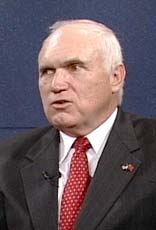Cadre.

This is coolbert:
Retired U.S. Army General Robert Scales is being interviewed on National Public Radio this evening.
Says that the U.S. Army in Iraq, the all-volunteer army, is holding up far better than anyone would have anticipated. Especially when you consider that some troops are going to have completed three tours of duty in three years.
He attributes this to the non-commissioned officer [NCO] corps. The sergeants. NCO's that are the first and second line supervisors of the enlisted men. The men at the lowest level of leadership that actually lead the troops forward. Scales feels the relatively excellent performance of the U.S. Army in Iraq is due in large measure to the NCO corps.
Having a cadre of highly trained and experienced NCO's is a great asset to a military. A lot of effort has been made to create an American NCO corps of educated troops, educated both in the civilian and military sector. And this has succeeded for the most part. YOU CANNOT ADVANCE AS A NCO UNLESS YOU COMPLETE THE REQUISITE COURSE, THE PLC [primary leadership course], THE BASIC, AND THE ADVANCED NCO COURSES.
Courses that emphasize the basic tenets of leadership, principles and traits. You learn all the things a sergeant needs to know in the modern military. Drill and ceremonies, how to conduct physical training, training troops in how to do their job, filling out of forms such as the 2404 [daily maintenance] and duty rosters, etc.
LEARNING HOW TO TRAIN is a big portion of sergeants school. NOT ONLY KNOWING YOUR OWN JOB, BUT TEACHING SOMEONE HOW TO DO THEIR JOB IS A BIG PORTION OF WHAT A NCO MUST DO!
[please recall that in the modern army, only about 1/2 of job skills that you need to know are taught at schools. The rest is taught at the unit level.]
General Scales feels that the current NCO corps in the Army is first rate. Also warns that the NCO's act as "canaries in the coal mine". If there is some basic systemic problem that is not being addressed, this will be reflected in NCO retention. HOW MANY CAREER NCO'S REENLIST IS A KEY TO KNOWING THE LEVEL OF SATISFACTION/DISSATISFACTION AMONG THE TROOPS. If reenlistment of career NCO's is high, things are going pretty good, if not, things are not so good.
This was observed during the latter days of the Vietnam War. By 1972 dissatisfaction among NCO's was so high that many career men just decided they had had enough and did not reenlist.
So far this has not happened with the all-volunteer army in Iraq.
Let us hope it does not ever happen!!
coolbert.

0 Comments:
Post a Comment
Subscribe to Post Comments [Atom]
<< Home